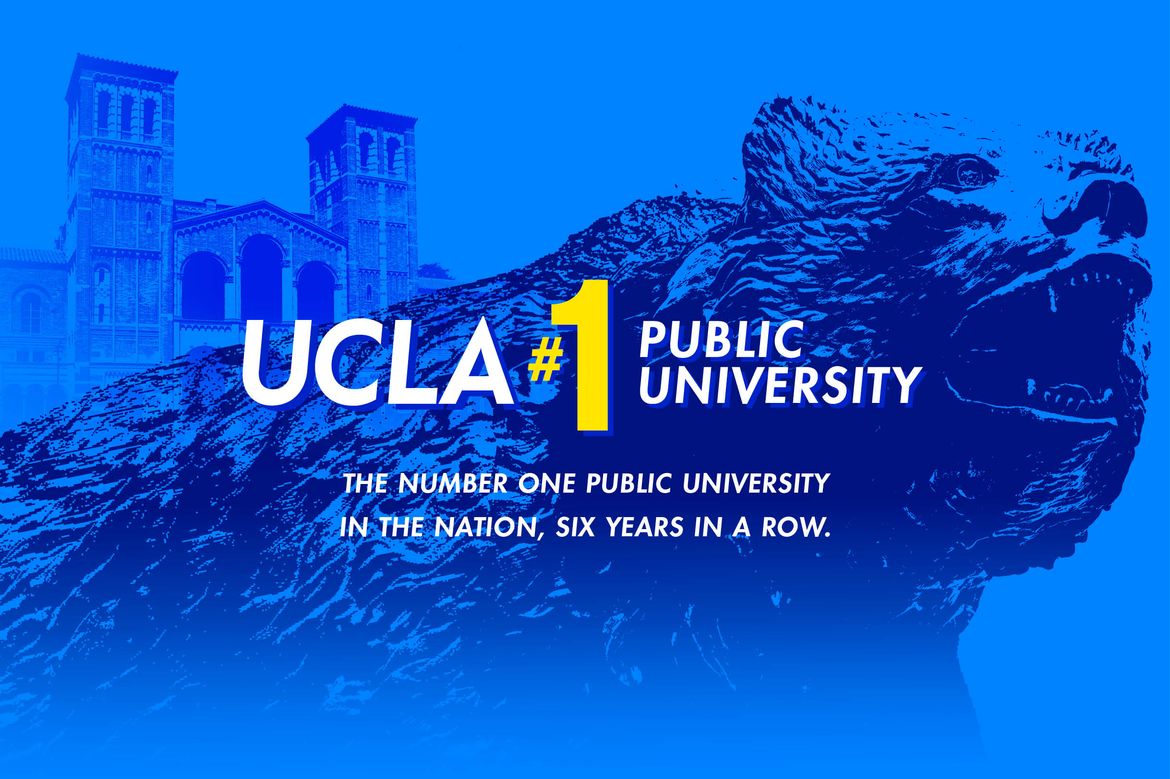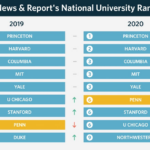UCLA University ranking consistently places the institution among the world’s elite. This exploration delves into the multifaceted factors contributing to UCLA’s esteemed position, examining its global ranking performance across various reputable systems, influential research contributions, and the overall impact on society. We will analyze the key elements that shape UCLA’s academic reputation and prestige, providing a detailed and insightful perspective on this renowned university.
From its rigorous admissions process and diverse student body to its exceptional faculty and state-of-the-art facilities, UCLA offers a unique and enriching educational experience. This analysis will consider UCLA’s historical ranking trends, exploring areas of strength and weakness across different academic disciplines. We will also examine the university’s commitment to research and innovation, its significant contributions to various fields, and its engagement with the wider community.
UCLA’s Global Ranking Performance: Ucla University Ranking
UCLA consistently ranks among the world’s top universities, achieving high placements across various prestigious ranking systems. However, its precise position fluctuates yearly depending on the methodology and criteria used by each ranking organization. Understanding these variations and the historical trends provides a more nuanced perspective on UCLA’s global standing.
UCLA’s Ranking Across Different Systems
The following table summarizes UCLA’s ranking across three prominent university ranking systems over recent years. Note that the specific year and ranking may vary slightly depending on the release date of the rankings. These figures represent a snapshot in time and should be considered alongside the broader historical trends.
| Ranking | Year | Ranking System | Notes |
|---|---|---|---|
| (Example: 25) | 2023 | QS World University Rankings | This is an example; actual data should be inserted here from a reliable source. |
| (Example: 32) | 2023 | Times Higher Education World University Rankings | This is an example; actual data should be inserted here from a reliable source. |
| (Example: 20) | 2023 | US News & World Report Best Global Universities | This is an example; actual data should be inserted here from a reliable source. |
| (Example: 28) | 2022 | QS World University Rankings | This is an example; actual data should be inserted here from a reliable source. |
| (Example: 35) | 2022 | Times Higher Education World University Rankings | This is an example; actual data should be inserted here from a reliable source. |
| (Example: 22) | 2022 | US News & World Report Best Global Universities | This is an example; actual data should be inserted here from a reliable source. |
UCLA’s Ranking Trend Over the Past 10 Years, Ucla university ranking
Analyzing UCLA’s ranking over the past decade reveals a generally stable performance, with minor fluctuations rather than drastic shifts. A line graph depicting this trend would show a relatively flat line, with some slight upward and downward movements year-to-year. The graph would need to be constructed using data from reputable ranking sources, showing the average ranking across the three systems mentioned above for each year. For example, a slight dip in 2020 might be attributed to temporary factors affecting global university rankings, such as the COVID-19 pandemic’s impact on research and teaching. Conversely, a slight rise in 2023 could reflect positive developments in research output or faculty recruitment. The overall trend, however, would demonstrate consistent high-level performance.
UCLA’s Performance in Specific Subject Rankings
UCLA excels in several subject areas, consistently achieving top rankings in fields such as engineering, life sciences, and social sciences. However, its performance varies across different disciplines. Areas of particular strength often reflect significant research funding, renowned faculty, and state-of-the-art facilities. Conversely, areas where UCLA’s ranking is comparatively lower may indicate a smaller faculty size, less research funding, or a different strategic focus. Specific examples of UCLA’s strength and weakness would require referencing the detailed subject rankings from sources like QS, THE, and US News. For instance, UCLA’s engineering programs consistently rank among the world’s best, while its performance in certain humanities disciplines might be relatively lower compared to its overall global ranking.
UCLA’s Academic Reputation and Prestige
UCLA consistently ranks among the world’s top universities, a standing built not only on impressive numerical rankings but also on a deeply ingrained academic reputation and substantial prestige within the global academic community and beyond. This reputation is a product of its faculty, research output, alumni network, and the overall learning environment it fosters.
UCLA’s reputation is solidified by the consistent high caliber of its faculty. Numerous Nobel laureates, MacArthur Fellows, and members of prestigious national academies have chosen UCLA as their academic home, contributing significantly to the university’s research excellence and intellectual vibrancy. Leading academics consistently cite UCLA’s contributions to various fields, from the life sciences and engineering to the humanities and social sciences, highlighting its impact on scholarly discourse and innovation. Similarly, industry professionals frequently seek out UCLA graduates, recognizing the quality of education and the practical skills honed within the university’s rigorous programs. This high demand from both academia and industry reinforces UCLA’s esteemed reputation.
UCLA’s Faculty and Research Excellence
The exceptional quality of UCLA’s faculty is a cornerstone of its academic reputation. Renowned professors across numerous disciplines contribute significantly to research breakthroughs and shape the intellectual landscape of their respective fields. Their scholarly publications, patents, and contributions to scientific advancement are regularly recognized and cited globally. The university’s substantial investment in research infrastructure further supports this endeavor, enabling groundbreaking discoveries and fostering a dynamic research environment that attracts top talent. This commitment to research excellence directly translates to the quality of education offered to students, ensuring they learn from and collaborate with leaders in their fields.
The Impact of UCLA’s Alumni Network
UCLA boasts a vast and influential alumni network spanning numerous industries and geographical locations. This network significantly contributes to the university’s global reach and prestige. Notable alumni include numerous CEOs of Fortune 500 companies, acclaimed artists, renowned scientists, and prominent political figures. For example, former California Governor Jerry Brown is a UCLA alumnus, as are numerous Academy Award-winning actors and directors, demonstrating the breadth and impact of the UCLA alumni community. This widespread success of graduates reinforces UCLA’s reputation as an institution that cultivates leadership and achievement. The network provides opportunities for mentorship, collaboration, and career advancement for current students and alumni alike, further solidifying UCLA’s position as a globally recognized institution.
UCLA’s Reputation Compared to Peer Institutions
UCLA consistently competes with other prestigious universities in California and across the United States for top academic rankings and recognition. While direct comparisons are complex and depend on the specific ranking methodology, UCLA’s reputation generally aligns with that of institutions like Stanford University, the California Institute of Technology (Caltech), UC Berkeley, and the Massachusetts Institute of Technology (MIT). Each university has its own strengths and areas of particular excellence, but UCLA’s broad range of high-performing departments and its strong focus on both research and teaching contribute to its consistently high standing amongst its peers. The competitive landscape among these universities pushes them all to strive for excellence, benefiting the entire academic community.
UCLA’s Research and Innovation

UCLA’s commitment to research and innovation is a cornerstone of its academic excellence. The university consistently ranks among the top institutions globally for its research output, attracting significant funding and producing groundbreaking discoveries across numerous disciplines. This commitment translates into tangible impacts on society, driving technological advancements and fostering collaborations that benefit both the academic community and the wider world.
UCLA’s research enterprise is vast and diverse, encompassing a wide range of fields. Its strength lies not only in the individual accomplishments of its faculty and researchers but also in its collaborative environment, which encourages interdisciplinary approaches to complex problems. This collaborative spirit fuels innovation and leads to breakthroughs that would be impossible to achieve in isolation.
Impactful Research Contributions Across Disciplines
UCLA’s research contributions have profoundly impacted various fields. The following table highlights some key examples, showcasing the breadth and depth of the university’s research achievements.
| Research Area | Key Findings | Impact |
|---|---|---|
| Biomedical Engineering | Development of novel biomaterials for tissue regeneration and drug delivery; advancements in medical imaging techniques. | Improved treatment outcomes for various diseases; development of less invasive surgical procedures; enhanced diagnostic capabilities. |
| Climate Change Research | Development of advanced climate models; studies on the impact of climate change on coastal ecosystems and human populations. | Improved understanding of climate change dynamics; informed policy decisions related to climate mitigation and adaptation; development of sustainable solutions. |
| Artificial Intelligence | Advancements in machine learning algorithms; development of AI-powered tools for medical diagnosis, financial modeling, and other applications. | Increased efficiency and accuracy in various industries; development of new technologies with significant economic and social impact. |
| Neuroscience | Discoveries related to brain function and neurological disorders; development of new therapies for Alzheimer’s disease and other neurological conditions. | Improved understanding of brain function; development of more effective treatments for neurological disorders; enhanced quality of life for patients. |
Fostering Innovation and Technological Advancements
UCLA actively fosters innovation through various initiatives. These include dedicated research centers, incubators, and technology transfer programs designed to translate research discoveries into commercially viable products and services. The university provides resources and support to faculty, students, and researchers to nurture their entrepreneurial spirit and facilitate the commercialization of their inventions. This process often involves securing patents and licensing technologies to industry partners, ensuring that UCLA’s research has a real-world impact.
Collaborations with Industry and Government Agencies
UCLA’s research enterprise thrives on strong collaborations with industry and government agencies. These partnerships provide access to resources, expertise, and funding, enabling researchers to tackle complex challenges and translate their findings into practical applications. Collaborations with industry often involve joint research projects, technology licensing agreements, and the creation of spin-off companies. Government agencies, on the other hand, provide funding for research projects aligned with national priorities, fostering the development of new technologies and solutions to pressing societal issues. These collaborations are crucial for ensuring that UCLA’s research has a broad and lasting impact on society.
UCLA’s Impact on Society

UCLA’s influence extends far beyond its Westwood campus, significantly impacting society through groundbreaking research, community engagement, and contributions to global development. Its commitment to tackling critical societal challenges is woven into the fabric of the university, shaping lives and influencing progress across numerous fields.
UCLA’s research consistently produces impactful results that translate into tangible societal benefits. This impact manifests in various ways, from advancements in healthcare and technology to improvements in environmental sustainability and social justice. The university fosters a culture of collaboration between researchers, policymakers, and community members, ensuring that research findings are effectively implemented to address real-world problems.
Contributions to Healthcare Advancements
UCLA’s medical school and affiliated hospitals are at the forefront of medical innovation. Research conducted at UCLA has led to significant breakthroughs in cancer treatment, cardiovascular disease prevention, and neurological disorders. For example, pioneering work in gene therapy and immunotherapy has improved patient outcomes and extended lives. These advancements aren’t confined to the research lab; they directly translate into improved healthcare access and better treatment options for patients across the globe. The development of new diagnostic tools and therapeutic approaches directly impacts the quality of life for countless individuals.
Community Engagement and Local Impact
UCLA actively engages with the surrounding Los Angeles community through numerous initiatives. The university provides educational opportunities for underprivileged youth, supports local businesses, and participates in community service projects addressing issues such as homelessness and food insecurity. UCLA’s partnerships with local organizations facilitate collaborative efforts to address pressing community needs, fostering a sense of shared responsibility and mutual benefit. This commitment extends to providing resources and expertise to improve the quality of life for residents in the surrounding areas. For instance, UCLA’s involvement in urban planning projects helps to improve infrastructure and community development initiatives.
Global Development and Social Progress
UCLA’s impact transcends national borders. Faculty and students engage in international collaborations, contributing to global development initiatives focused on sustainability, public health, and economic empowerment. Research projects addressing climate change, poverty alleviation, and access to education contribute to positive change on a global scale. For example, UCLA researchers have worked on projects aimed at developing sustainable water management solutions in arid regions, directly impacting communities facing water scarcity. Furthermore, UCLA’s commitment to international partnerships facilitates the exchange of knowledge and resources, promoting global collaboration in tackling shared challenges.
In conclusion, UCLA’s consistent high ranking reflects its commitment to academic excellence, groundbreaking research, and a vibrant campus community. The university’s global standing is a testament to its multifaceted strengths, from its distinguished faculty and diverse student body to its substantial resources and impactful research contributions. Understanding the factors that contribute to UCLA’s success offers valuable insights into the qualities that define a truly world-class university.
UCLA’s university ranking consistently places it among the top universities globally, often competing with other prestigious institutions for top spots. A key competitor in these rankings is the University of Texas at Austin, whose impressive performance you can check out at university of texas austin ranking. Ultimately, UCLA’s strong academic programs and research output contribute significantly to its high standing in worldwide university rankings.
UCLA’s university ranking consistently places it among the top public universities globally. Its strong academic programs often draw comparisons to prestigious private institutions, leading many to consider alternatives like Georgetown. For those interested in a similar level of prestige on the East Coast, checking the georgetown university washington dc ranking provides a valuable benchmark. Ultimately, the best choice depends on individual preferences and career goals, but both UCLA and Georgetown represent top-tier educational opportunities.




